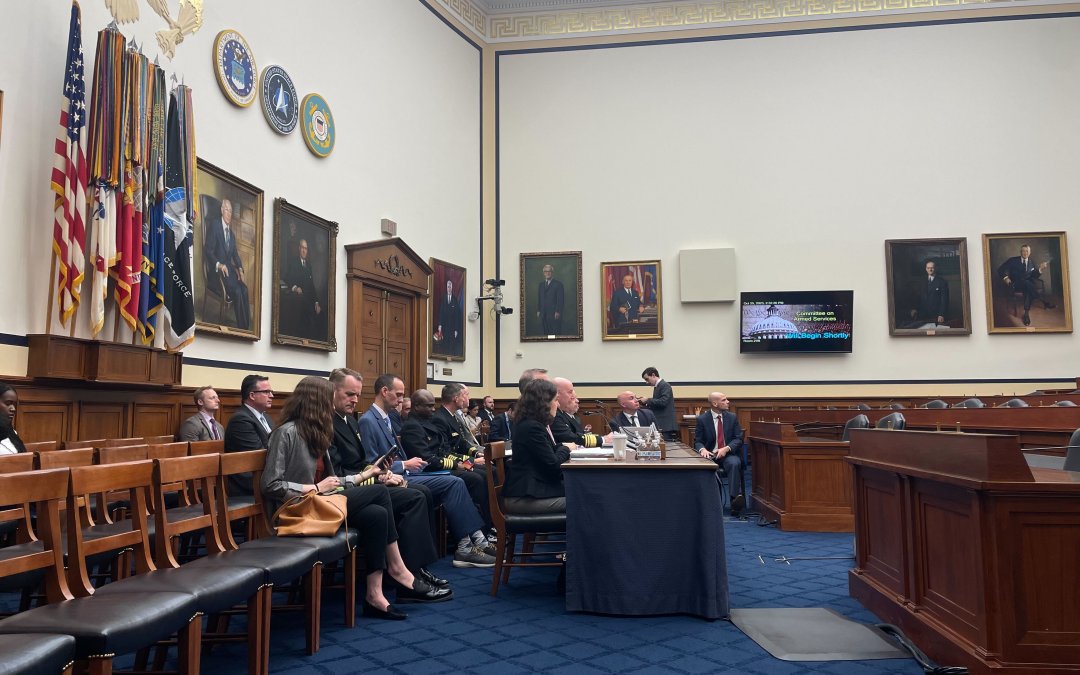WASHINGTON — House representatives are worried that on-the-ground development of the submarine industrial base may become a victim of the new House speaker’s push to reduce government expenses.
The issue became a focus of a House Armed Services subcommittee hearing last Wednesday, held minutes after Rep. Mike Johnson, R-La., was elected the new speaker of the House.
The Biden administration two weeks ago requested $3.4 billion in a supplemental funding plan aimed at strengthening the American submarine industrial base, specifically by adding to the fleet of Virginia-class nuclear-powered submarines. While the package primarily focused on more money for Israel and Ukraine, adding submarines would bolster the U.S.’ deterrence policy, a key defense strategy against China and in the Israel-Hamas war.
But representatives warned defense officials that the strategy could be at risk with the new goals of House leaders.
“My mind is troubled,” Rep. John Garamendi, D-Calif., said, referencing Johnson’s opening remarks to reduce the deficit, backed by conservatives calling for budget cuts.
COVID-19 supply chain issues and maintenance backlogs have also strained the development of the submarine industrial base over the past two years, Rep. Trent Kelly, R-Miss., said.
Several members of Congress questioned whether the submarine-building is actually happening, especially because of a worker shortage — and whether those factors could threaten national security.
“It’s one thing for the defense ministers to get together,” Rep. Joe Courtney, D-Conn., said. “It’s another thing for the people doing all the welding to get together.”
Rep. Robert Wittman, R-Va., also raised the concern of employee retention. “It’s also the quality of life for these shipyard workers,” he said. “If we don’t have people in the yards to build these submarines, this enterprise fails.”
But witnesses urged members of Congress to support investment. Mara Karlin, the DOD’s deputy undersecretary for policy, said there has been robust bipartisan support for the submarine industrial base, pointing to America’s undersea capabilities as a “comparative advantage” on the global stage.
Karlin said that investing in the submarine base would continue support for the U.S. National Defense Strategy, which is a DOD plan released every four years. She said the strategy hinges on the AUKUS agreement, a trilateral security partnership between Australia, the United Kingdom and the U.S. Australian Prime Minister Anthony Albanese visited Washington last week to discuss the partnership’s developments.
“We’re making sure all three have the most capable undersea capabilities and are going to be able to operate together to help ensure a secure and safe Indo-Pacific,” she said.
Defense officials told lawmakers they were looking at ways to address the workforce problem. Erik Raven, the undersecretary of the Navy, said the military plans to bring hundreds of Australian workers to the U.S. to train them in building submarines.
Vice Admiral William Houston urged Congress to move forward with legislative proposals soon. Despite the tough questions, however, lawmakers and witnesses reiterated the importance of the trilateral partnership.
“I’m not sure about everything else,” Garamendi said in an interview. “But AUKUS will continue.”

